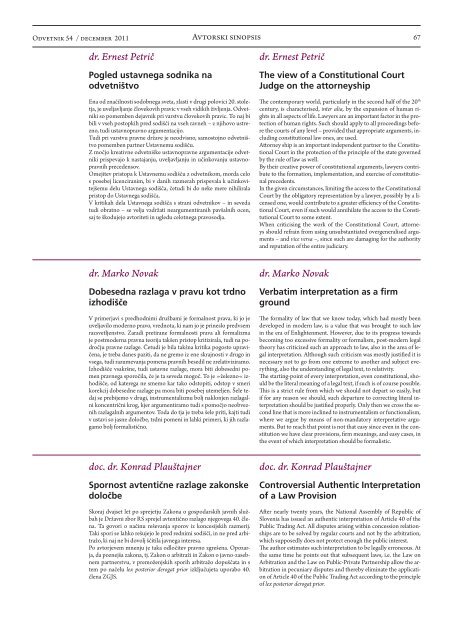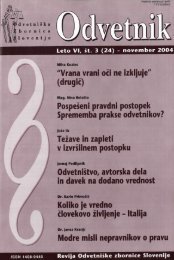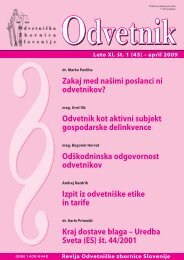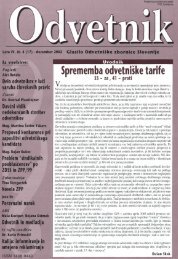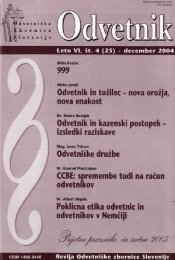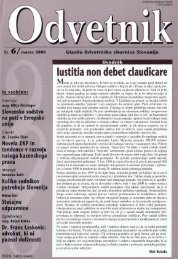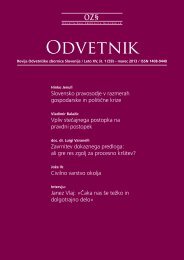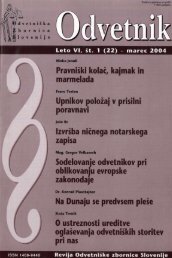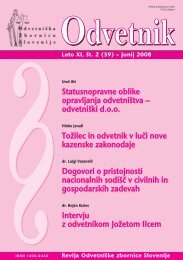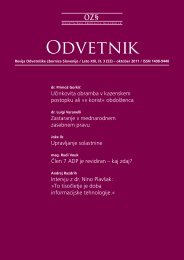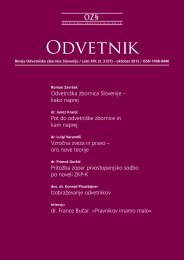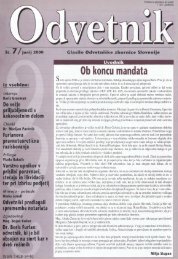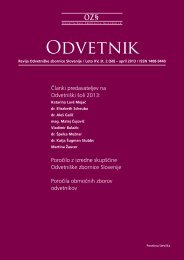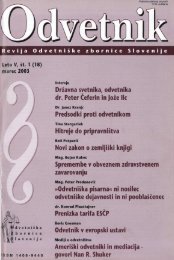Številka 54 - Odvetniška Zbornica Slovenije
Številka 54 - Odvetniška Zbornica Slovenije
Številka 54 - Odvetniška Zbornica Slovenije
Create successful ePaper yourself
Turn your PDF publications into a flip-book with our unique Google optimized e-Paper software.
Odvetnik <strong>54</strong> / december 2011 Avtorski sinopsis<br />
67<br />
dr. Ernest Petrič<br />
Pogled ustavnega sodnika na<br />
odvetništvo<br />
Ena od značilnosti sodobnega sveta, zlasti v drugi polovici 20. stoletja,<br />
je uveljavljanje človekovih pravic v vseh vidikih življenja. Odvetniki<br />
so pomemben dejavnik pri varstvu človekovih pravic. To naj bi<br />
bili v vseh postopkih pred sodišči na vseh ravneh – z njihovo ustrezno,<br />
tudi ustavnopravno argumentacijo.<br />
Tudi pri varstvu pravne države je neodvisno, samostojno odvetništvo<br />
pomemben partner Ustavnemu sodišču.<br />
Z močjo kreativne odvetniške ustavnopravne argumentacije odvetniki<br />
prispevajo k nastajanju, uveljavljanju in učinkovanju ustavnopravnih<br />
precedensov.<br />
Omejitev pristopa k Ustavnemu sodišču z odvetnikom, morda celo<br />
s posebej licenciranim, bi v danih razmerah prispevala k učinkovitejšemu<br />
delu Ustavnega sodišča, četudi bi do neke mere nihilirala<br />
pristop do Ustavnega sodišča.<br />
V kritikah dela Ustavnega sodišča s strani odvetnikov – in seveda<br />
tudi obratno – se velja vzdržati neargumentiranih pavšalnih ocen,<br />
saj te škodujejo avtoriteti in ugledu celotnega pravosodja.<br />
dr. Ernest Petrič<br />
The view of a Constitutional Court<br />
Judge on the attorneyship<br />
The contemporary world, particularly in the second half of the 20 th<br />
century, is characterised, inter alia, by the expansion of human rights<br />
in all aspects of life. Lawyers are an important factor in the protection<br />
of human rights. Such should apply to all proceedings before<br />
the courts of any level – provided that appropriate arguments, including<br />
constitutional law ones, are used.<br />
Attorney ship is an important independent partner to the Constitutional<br />
Court in the protection of the principle of the state governed<br />
by the rule of law as well.<br />
By their creative power of constitutional arguments, lawyers contribute<br />
to the formation, implementation, and exercise of constitutional<br />
precedents.<br />
In the given circumstances, limiting the access to the Constitutional<br />
Court by the obligatory representation by a lawyer, possibly by a licensed<br />
one, would contribute to a greater efficiency of the Constitutional<br />
Court, even if such would annihilate the access to the Constitutional<br />
Court to some extent.<br />
When criticising the work of the Constitutional Court, attorneys<br />
should refrain from using unsubstantiated overgeneralised arguments<br />
– and vice versa –, since such are damaging for the authority<br />
and reputation of the entire judiciary.<br />
dr. Marko Novak<br />
Dobesedna razlaga v pravu kot trdno<br />
izhodišče<br />
V primerjavi s predhodnimi družbami je formalnost prava, ki jo je<br />
uveljavilo moderno pravo, vrednota, ki nam jo je prineslo predvsem<br />
razsvetljenstvo. Zaradi pretirane formalnosti prava ali formalizma<br />
je postmoderna pravna teorija takšen pristop kritizirala, tudi na področju<br />
pravne razlage. Četudi je bila takšna kritika pogosto upravičena,<br />
je treba danes paziti, da ne gremo iz ene skrajnosti v drugo in<br />
vsega, tudi razumevanja pomena pravnih besedil ne zrelativiziramo.<br />
Izhodišče vsakršne, tudi ustavne razlage, mora biti dobesedni pomen<br />
pravnega sporočila, če je ta seveda mogoč. To je »železno« izhodišče,<br />
od katerega ne smemo kar tako odstopiti, odstop v smeri<br />
korekcij dobesedne razlage pa mora biti posebej utemeljen. Šele tedaj<br />
se prebijemo v drugi, instrumentalizmu bolj naklonjen razlagalni<br />
koncentrični krog, kjer argumentiramo tudi s pomočjo neobveznih<br />
razlagalnih argumentov. Toda do tja je treba šele priti, kajti tudi<br />
v ustavi so jasne določbe, trdni pomeni in lahki primeri, ki jih razlagamo<br />
bolj formalistično.<br />
dr. Marko Novak<br />
Verbatim interpretation as a firm<br />
ground<br />
The formality of law that we know today, which had mostly been<br />
developed in modern law, is a value that was brought to such law<br />
in the era of Enlightenment. However, due to its progress towards<br />
becoming too excessive formality or formalism, post-modern legal<br />
theory has criticized such an approach to law, also in the area of legal<br />
interpretation. Although such criticism was mostly justified it is<br />
necessary not to go from one extreme to another and subject everything,<br />
also the understanding of legal text, to relativity.<br />
The starting-point of every interpretation, even constitutional, should<br />
be the literal meaning of a legal text, if such is of course possible.<br />
This is a strict rule from which we should not depart so easily, but<br />
if for any reason we should, such departure to correcting literal interpretation<br />
should be justified properly. Only then we cross the second<br />
line that is more inclined to instrumentalism or functionalism,<br />
where we argue by means of non-mandatory interpretative arguments.<br />
But to reach that point is not that easy since even in the constitution<br />
we have clear provisions, firm meanings, and easy cases, in<br />
the event of which interpretation should be formalistic.<br />
doc. dr. Konrad Plauštajner<br />
Spornost avtentične razlage zakonske<br />
določbe<br />
Skoraj dvajset let po sprejetju Zakona o gospodarskih javnih službah<br />
je Državni zbor RS sprejel avtentično razlago njegovega 40. člena.<br />
Ta govori o načinu reševanja sporov iz koncesijskih razmerij.<br />
Taki spori se lahko rešujejo le pred rednimi sodišči, in ne pred arbitražo,<br />
ki naj ne bi dovolj ščitila javnega interesa.<br />
Po avtorjevem mnenju je taka odločitev pravno zgrešena. Opozarja,<br />
da poznejša zakona, tj. Zakon o arbitraži in Zakon o javno-zasebnem<br />
partnerstvu, v premoženjskih sporih arbitražo dopuščata in s<br />
tem po načelu lex posterior derogat prior izključujeta uporabo 40.<br />
člena ZGJS.<br />
doc. dr. Konrad Plauštajner<br />
Controversial Authentic Interpretation<br />
of a Law Provision<br />
After nearly twenty years, the National Assembly of Republic of<br />
Slovenia has issued an authentic interpretation of Article 40 of the<br />
Public Trading Act. All disputes arising within concession relationships<br />
are to be solved by regular courts and not by the arbitration,<br />
which supposedly does not protect enough the public interest.<br />
The author estimates such interpretation to be legally erroneous. At<br />
the same time he points out that subsequent laws, i.e. the Law on<br />
Arbitration and the Law on Public-Private Partnership allow the arbitration<br />
in pecuniary disputes and thereby eliminate the application<br />
of Article 40 of the Public Trading Act according to the principle<br />
of lex posterior derogat prior.


